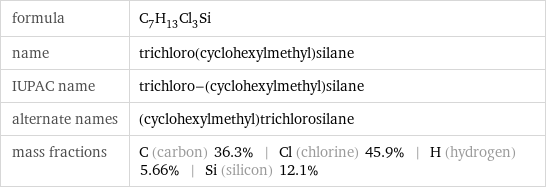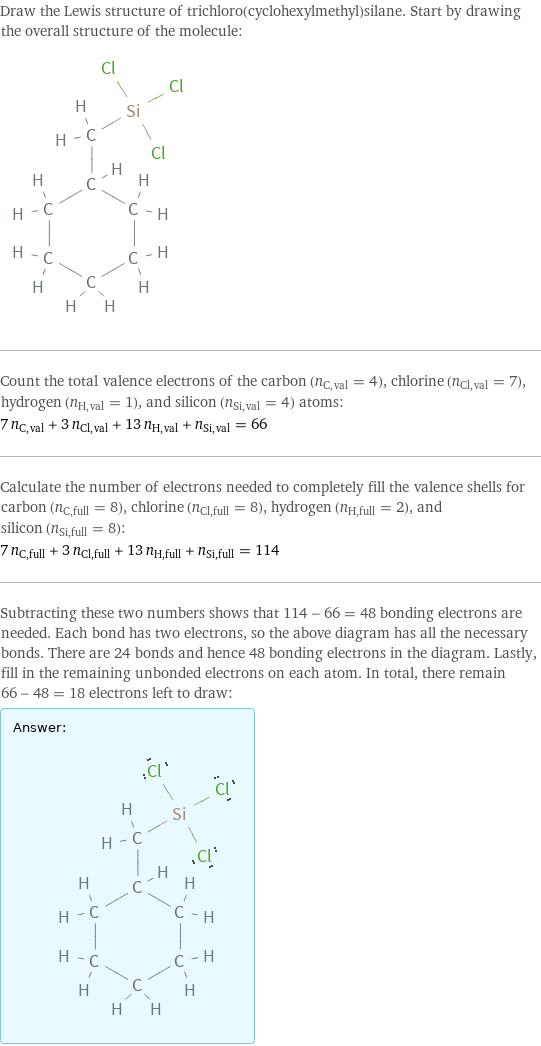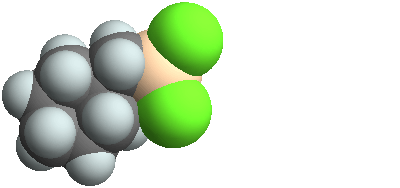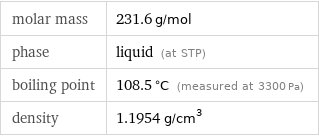Input interpretation

trichloro(cyclohexylmethyl)silane
Chemical names and formulas

formula | C_7H_13Cl_3Si name | trichloro(cyclohexylmethyl)silane IUPAC name | trichloro-(cyclohexylmethyl)silane alternate names | (cyclohexylmethyl)trichlorosilane mass fractions | C (carbon) 36.3% | Cl (chlorine) 45.9% | H (hydrogen) 5.66% | Si (silicon) 12.1%
Lewis structure

Draw the Lewis structure of trichloro(cyclohexylmethyl)silane. Start by drawing the overall structure of the molecule: Count the total valence electrons of the carbon (n_C, val = 4), chlorine (n_Cl, val = 7), hydrogen (n_H, val = 1), and silicon (n_Si, val = 4) atoms: 7 n_C, val + 3 n_Cl, val + 13 n_H, val + n_Si, val = 66 Calculate the number of electrons needed to completely fill the valence shells for carbon (n_C, full = 8), chlorine (n_Cl, full = 8), hydrogen (n_H, full = 2), and silicon (n_Si, full = 8): 7 n_C, full + 3 n_Cl, full + 13 n_H, full + n_Si, full = 114 Subtracting these two numbers shows that 114 - 66 = 48 bonding electrons are needed. Each bond has two electrons, so the above diagram has all the necessary bonds. There are 24 bonds and hence 48 bonding electrons in the diagram. Lastly, fill in the remaining unbonded electrons on each atom. In total, there remain 66 - 48 = 18 electrons left to draw: Answer: | |
3D structure

3D structure
Basic properties

molar mass | 231.6 g/mol phase | liquid (at STP) boiling point | 108.5 °C (measured at 3300 Pa) density | 1.1954 g/cm^3
Units

Liquid properties (at STP)

density | 1.1954 g/cm^3 refractive index | 1.4759
Units

Chemical identifiers
(Cl)Cl InChI identifier | InChI=1/C7H13Cl3Si/c8-11(9, 10)6-7-4-2-1-3-5-7/h7H, 1-6H2 EU number | 242-265-7](../image_source/7e937f538169b8be05c0c9508db60ea1.png)
CAS number | 18388-16-4 Beilstein number | 2935348 PubChem CID number | 87618 SMILES identifier | C1CCC(CC1)C[Si](Cl)(Cl)Cl InChI identifier | InChI=1/C7H13Cl3Si/c8-11(9, 10)6-7-4-2-1-3-5-7/h7H, 1-6H2 EU number | 242-265-7